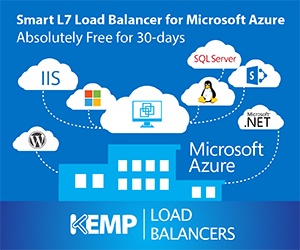
Ask The Microsoft Experts: Azure & Office 365
Start Free TrialKemp recently sponsored an “Ask The Experts” webinar on MSExchange.org featuring Keith Mayer, Senior Technical Evangelist for Microsoft, Steve Goodman, Consultant for Ciber UK and a Microsoft MVP, Michael Van Horenbeeck of ENow – also a Microsoft MVP, and Kemp’s own Director of Product Research Bhargav Shukla, a Microsoft MVP, MCM and MCSM.
Here is a brief synopsis of the top questions and answers from the webinar. To listen to the full recording of this webinar, click here.
1. What is the biggest benefit to running Azure with MS Office 365?

Keith Mayer of Microsoft : Azure is Microsoft’s cloud platform and is really an extension of Office 365. The added benefit of Azure is that it allows you to run customized business applications from a virtual machine standpoint and to develop custom web applications that can easily integrate with SharePoint online. Azure also extends Office 365 with custom mobile application support. For those organizations running Active Directory with Office 365, Azure allows you to take that hybrid active directory infrastructure and extend it, providing single sign-on to thousands of third-party commercial SaaS applications outside of the Microsoft ecosystem.
2. Does it make financial sense to run both Azure and Office 365 for an enterprise organization with 2500 users and 200 servers and how does the cost and reliability compare to VMware?
Steve Goodman, Microsoft MVP : The main difference between VMware and Office 365 is that Office 365 is a Software as a Service (SaaS) solution, whereas VMware is tied to your actual storage area network and acts as the platform on which to run the server. With Office 365, you’re getting a different type of infrastructure with multi-tenant options, such as a SharePoint environment and Lync online. Azure is complementary to the Office 365 infrastructure and can help you build a more reliable system and can save you money in the long run.
Keith Mayer of Microsoft: Another difference from VMware is that cloud services like Office 365 and Azure also provide you with a service level agreement, which is financially backed by Microsoft.
3. What’s the main difference between Azure and Office 365 and is there an easy way to collect documents from both?
Bhargav Shukla, Microsoft MVP, MCM and MCSM : Office 365 is an office suite with standard apps like Exchange, Lync and Sharepoint included. It is run in cloud and the software is managed in cloud by Microsoft. If you are an IT administrator, you will only need to manage users and license subscriptions with Office 365.
Azure allows you to run your platform as a service. If you are a developer, you can create your own custom applications and publish them on Azure. Azure gives you complete control over which VMs to deploy. However, as an IT administrator, you are responsible for managing the VM configuration, although Microsoft will assist you, of course.
As for collecting documents for a legal hold, you can do by selecting those documents that are stored through Exchange, both in the emails themselves and in attachments or those in SharePoint. With proper integration and permissions, a user can access legal hold features by performing a query to find specific content.
4. How are partners and resellers growing their businesses with Azure & Office 365?
Michael Van Horenbeeck, Microsoft MVP : Partners and resellers grow their business by adding value for their customers. This is what they are doing with Azure and Office 365, as both platforms are extremely flexible. Partners can also leveraging their knowledge by offering best practices and advice to their customers who are deploying Microsoft infrastructure. Offering training, migration services & other forms of assistance is a great value add for both you and your customers.
5. In Azure, do I set up a group of VMs or cloud services?
Keith Mayer of Microsoft : Azure VMs actually run inside of cloud services. Azure provides a cloud service environment complete with load balancing, security and high availability for the VMs. Cloud services simply act as the container for a group of VMs.
6. What are the benefits of running Azure over an on-premise solution?
Bhargav Shukla, Microsoft MVP, MCM and MCSM : When you have applications deployed on premise, you need to pay attention to many different components, including servers, networks, office space, electricity (including air-conditioning for your server rooms) and other administrative costs.
With Azure, you simply pay a monthly fee to have someone else manage all those aspects for you. Another benefit is that you are able to get your VM set up very quickly and it is less costly. Also, component failures are handled automatically by Microsoft, allowing your infrastructure to be more agile.
Keith Mayer of Microsoft : From a business standpoint, one of the greatest benefits of using Azure over an on-premise solution is that you have instant access to continuous innovation and upgrades. With on premise, you usually have an annual contract/process, which doesn’t really allow your infrastructure to be dynamic and support elastic growth.
7. Is public folder migration from onsite MSExchange to Office 365 supported?
Michael Van Horenbeeck, Microsoft MVP :Migrating mailboxes to Office 365 is pretty easy, but moving from legacy versions such as Exchange 2007 or 2010 requires a bit more planning. While it’s the same process as migrating mailboxes to Exchange 2013, it does involve exporting to a .csv file and then re-importing that file for migration. There are actually a few third party tools that can assist in this type of migration.
8. What Office 365 version is offered in the cloud?
Bhargav Shukla, Microsoft MVP, MCM and MCSM : Currently, Exchange 2013 is available in the cloud.
9. When will two-way active directory sync be available for Office 365?
Steve Goodman, Microsoft MVP : In theory, this type of sync is available right now. For example, if you are using directory sync, a number of your attributes are synced back on premise. Proxy address and password write-back gets synced back now. Very soon, you will be able to edit attributes and an ADC sync tool will be available in the near future as well.
10. What are the pros and cons of Office 365 onsite as compared to an onsite version of MSExchange?
Michael Van Horenbeeck, Microsoft MVP :
PROS: Clearly, there are many more benefits with Office 365. With Office 365, you no longer have to be concerned about the servers because they are handled by Microsoft. Microsoft is responsible for making sure you have connectivity and high availability. This means you can focus on using the software to be more productive rather than having to manage the software yourself.
CONS: While Office 365 is extremely flexible, there are a few limitations in service, such as message size. In this case, these types of applications should be kept on premise.
Steve Goodman, Microsoft MVP : One of the cons when moving to the cloud is that you lose the ability to build custom in-house or third party solutions that integrate into your infrastructure. However, Office 365 is constantly improving, while with an on-premise solution, you are tasked with staying up to date with latest patches and updates.
11. Is there a threshold as far as the number of users that dictates when you should switch to Office 365?
Bhargav Shukla, Microsoft MVP, MCM and MCSM : There is not really a specific number of users you should have in order to make the switch to Office 265. If you’re looking to use Office 365 in order to be more agile and innovative, then it would work for a small business with 10 or fewer users up to an enterprise with hundreds or thousands of users.
Smaller organizations can really benefit from implementing Office 365 because they don’t have the budget, expertise, or manpower to manage an on-premise solution. With on-premise, you have to deploy servers, manage the data center, and basically be an expert in all things Microsoft Exchange in order to maintain it properly.
12. Why would a smaller organization want to switch to Office 365 and Azure? What are the advantages?
Michael Van Horenbeeck, Microsoft MVP : In smaller environment, let’s say 150 seats with a single Exchange server, you really have no high availability. Moving to Office 365 gives you instant high availability along with cost savings because Microsoft is managing it, not you.
Keith Mayer of Microsoft : Office 365 is really not size specific. Microsoft actually uses it for hundreds of thousands of field workers across the globe. The real benefit of Office 365 is in the feature set, which allows you to be more agile and invest the money saved in other aspects of the business.
Steve Goodman, Microsoft MVP : If you made the switch from Exchange 2010 and Office 2010 to Office 365, you immediately get Lync and SharePoint as added features. Also, if you are running a single Exchange server and it breaks, your email could be down for a day or more. Think about how much productivity you could lose!
13. When migrating over to Office 365, what are the top things an IT administrator should look out for?
Steve Goodman, Microsoft MVP : When migrating to Office 365, you’ll need to pay attention to bandwidths and what’s in between as far as a proxy server. Having everything go through a single port could cause a substantial bottleneck. You have to look at things like mailbox sizes and really have a clear understanding of how sharing works.
You also need to make sure that you communicate changes with your users. Communication and proper training are both key to successful adoption. If you’re paying for all the good stuff that comes with Office 365, you want to make sure that people are actually using it!
14. What is the one driving force for migration to Office 365?
Bhargav Shukla, Microsoft MVP, MCM and MCSM : Office 365 is a platform offered by and supported by Microsoft as a cloud service. Whenever you are choosing Software as a Service (SaaS), there are several things to take into consideration. What will you be using Office 365 for? Will you benefit from Lync instant messaging and SharePoint collaboration services? There should really be an overall vision for the company when making this decision.
An important aspect to consider is that Office 365 is backed by Microsoft and financial penalties are at stake when it is not performing properly. Microsoft’s Office 365 roadmap is clearly laid out with a dedicated site that shows you what updates are coming. You get immediate access to these new features when they are available.
Keith Mayer of Microsoft : Many customers are searching for ways the IT team can deliver impactful results to the bottom line. Adm. Instead of spending a lot of money on hardware support costs, moving email and document storage to Office 365 reduces infrastructure costs. That savings can be refocused on more customized network solutions that can deliver more value.
